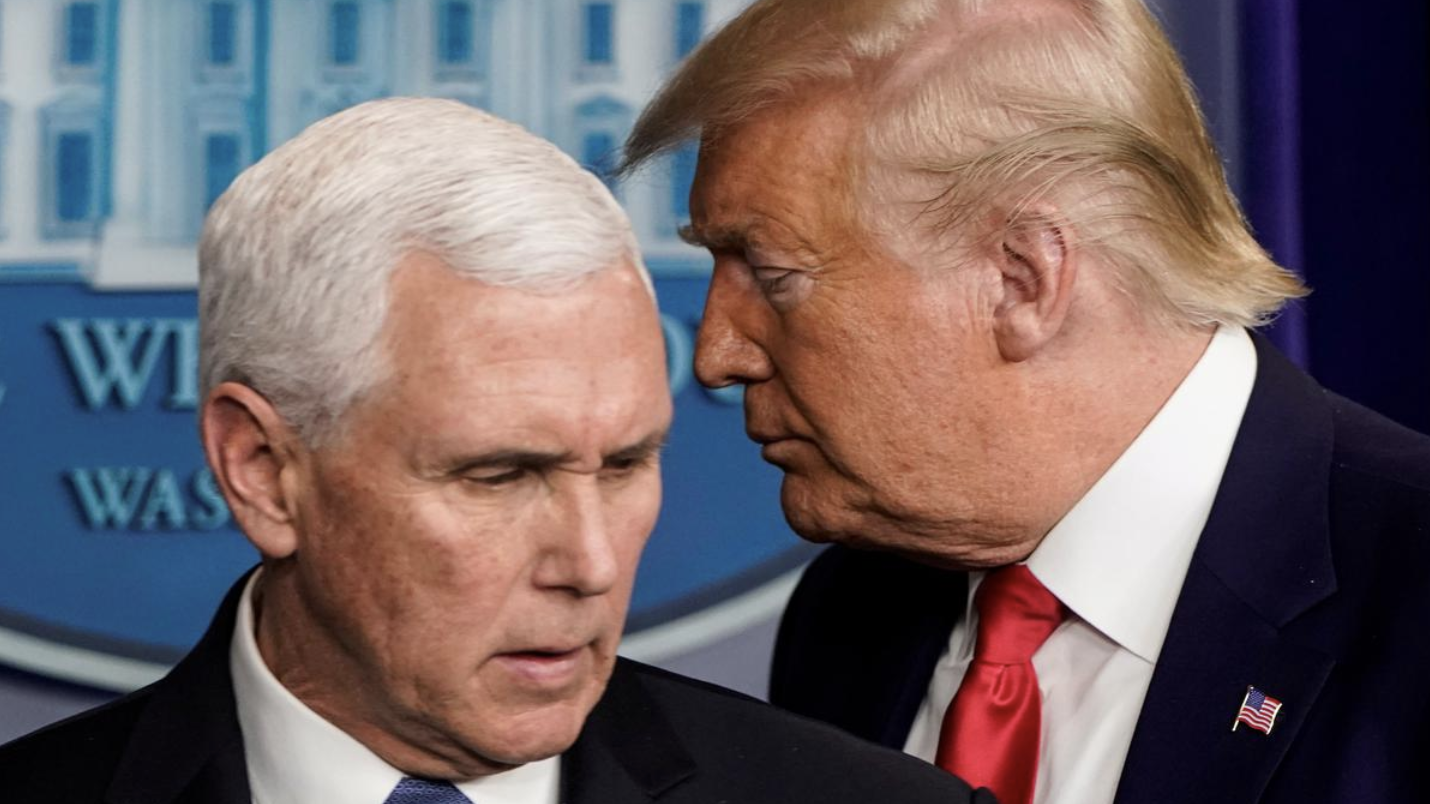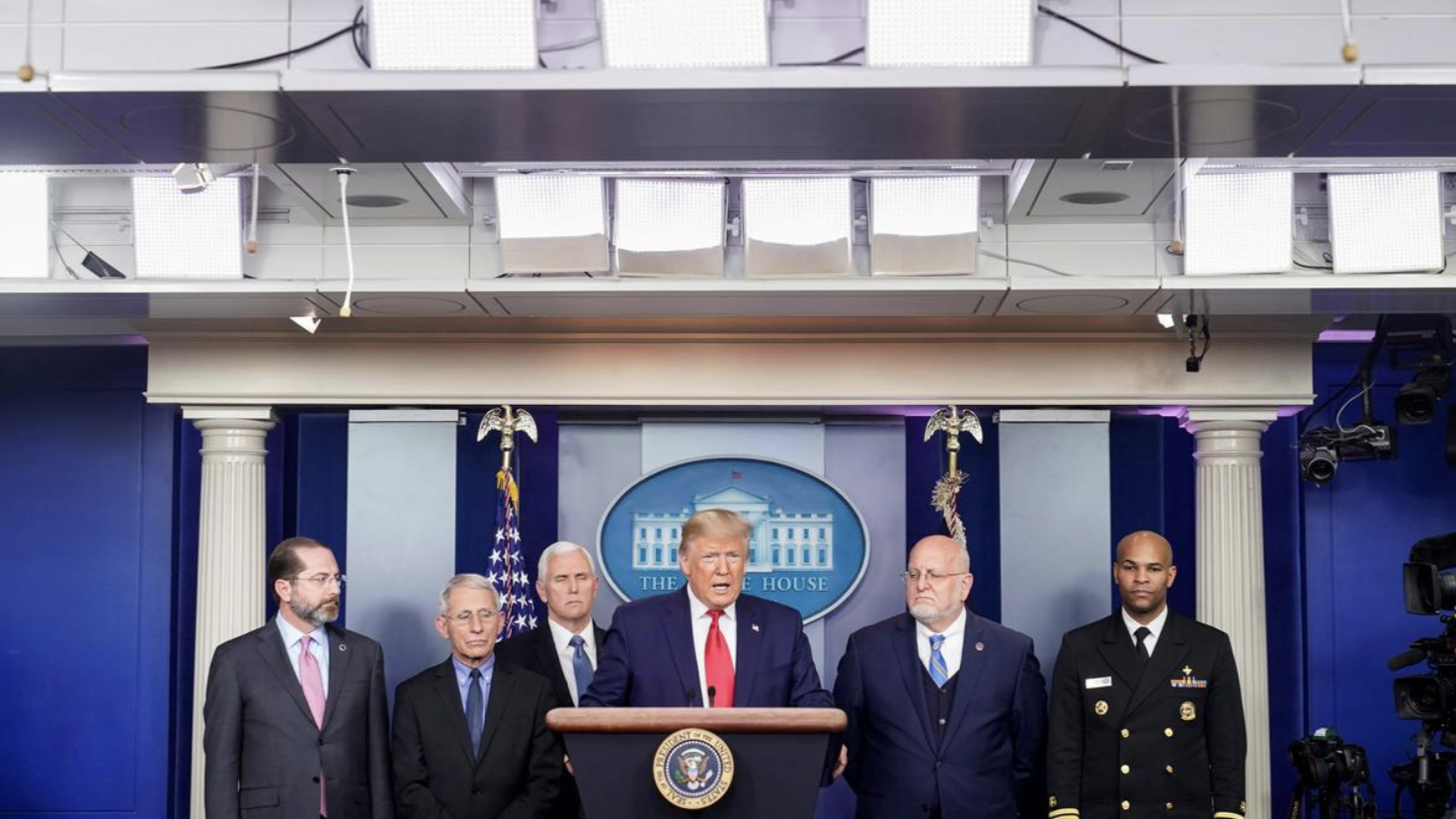Senior officials in U.S. President Donald Trump's administration on Sunday tried to calm market panic that the coronavirus could cause a global recession, saying the U.S. public had over-reacted and that stocks would rebound due to the American economy's underlying strength.
The S&P 500 index dropped 11.5 percent last week as the virus accelerated beyond China's borders, the worst weekly drop since the 2008 global financial crisis. Roughly four trillion U.S. dollars have been wiped off the value of U.S. stocks.
Economists have begun to worry that the losses could soon start to weigh on consumer spending even before the virus becomes widespread in the United States.
U.S. financial regulators who will gather on Wednesday face their most challenging week in a decade. One official told Reuters that the coming days will determine whether the federal government must take measures to bolster market confidence.

U.S. President Donald Trump passes U.S. Vice President Mike Pence during a news conference on the coronavirus outbreak at the White House in Washington, DC, U.S., February 29, 2020. Joshua Roberts/Reuters
U.S. President Donald Trump passes U.S. Vice President Mike Pence during a news conference on the coronavirus outbreak at the White House in Washington, DC, U.S., February 29, 2020. Joshua Roberts/Reuters
Speaking to NBC's "Meet the Press" on Sunday, U.S. Vice President Mike Pence, who is leading the administration's response to the epidemic, said that the market "will come back."
"The fundamentals of this economy are strong. We just saw some new numbers come out in housing and consumer confidence and business optimism. Unemployment is at a 50-year low. More Americans are working than ever before," Pence said.
On Friday afternoon, U.S. Federal Reserve chair Jay Powell sought also to quell fears, flagging that the central bank would take action if necessary to support the economy, which he said remained strong.
Trump, seeking re-election on November 3, has pressed his view that the risk to the American people from the virus remains "very low" even as he has faced Democratic criticism that his administration had bungled its response to the outbreak.
When asked on the "Fox News Sunday" program if the American people are over-reacting to the current threat, U.S. Health and Human Services Secretary Alex Azar responded, "Yes, absolutely."
The World Health Organization's director-general Tedros Adhanom Ghebreyesus likewise told CNBC on Sunday that the market panic was uncalled for, even after the organization on Friday raised its threat assessment for the virus to its highest level.

U.S. President Donald Trump (C) speaks during a news conference on the coronavirus outbreak with (L-R) U.S. Secretary of Health and Human Services Alex Azar, National Institute of Allergy and Infectious Diseases Anthony Fauci, Vice President Mike Pence, Director of the Centers for Disease Control and Prevention Robert Redfield and U.S. Surgeon General Jerome Adams at the White House in Washington, DC, U.S., February 29, 2020. Joshua Roberts/Reuters
U.S. President Donald Trump (C) speaks during a news conference on the coronavirus outbreak with (L-R) U.S. Secretary of Health and Human Services Alex Azar, National Institute of Allergy and Infectious Diseases Anthony Fauci, Vice President Mike Pence, Director of the Centers for Disease Control and Prevention Robert Redfield and U.S. Surgeon General Jerome Adams at the White House in Washington, DC, U.S., February 29, 2020. Joshua Roberts/Reuters
"Global markets ... should calm down and try to see the reality," he said.
The fast-spreading virus has infected around 85,000 people in 53 countries. China, the world's second-largest economy and epicenter of the outbreak, is home to the vast majority of cases. About 70 have been diagnosed in the United States.
A Washington state man in his 50s with underlying health conditions was the first American to die from the virus, officials said Saturday.
Writing on Twitter late on Saturday, Mohamed El-Erian, chief economic adviser to Allianz, said reassuring words may not be enough to stem the rout, given the negative news.
"Absent anything else, I worry that this may still tip net negative" on Monday trading resumption, he wrote.
The rapid spread of the virus has led businesses globally to restrict travel, send workers home and cancel conferences, hitting stocks in the aviation, gambling, tourism and luxury goods sectors. That disruption to global supply chains and productivity has darkened the outlook for a world economy already struggling with the fallout of the U.S.-China trade war.
So far, the outbreak's biggest measurable effect has been in China, but a purchasing managers survey last month signaled it was beginning to hit U.S. businesses. Another batch of U.S. economic indicators due out early this week will be closely watched for evidence of a growing impact.
Pence said the U.S. government is doing "everything possible" to prevent the virus from spreading and that he is "confident" the United States is prepared.
Azar said that during a meeting of the White House's coronavirus task force on Saturday, U.S. Treasury Secretary Steven Mnuchin had discussed the negative stock market reaction, saying that much of it was driven by uncertainty. Azar said the administration aimed to quell that uncertainty by being as transparent as possible about latest developments.
"That's why we are trying to give the American people all the information we have when we have it so they don't think there's secret information they're not getting," Azar said.
(With input from Reuters)